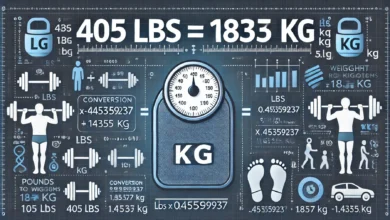153 Pounds Kgs: Simple Weight Conversion Explained

When you encounter the term “153 pounds kgs,” it often sparks curiosity about how to convert pounds to kilograms. Whether you’re trying to figure out your weight in a different measurement system or simply exploring unit conversions, this article will guide you through the entire process.
Understanding weight conversions is essential, especially in countries where the metric system (kilograms) is commonly used while others like the U.S. still rely on the imperial system (pounds). Let’s dive deep into the simple steps of converting 153 pounds into kilograms and understand the intricacies of this unit swap.
How to Convert 153 Pounds Kgs?
To convert pounds into kilograms, a straightforward formula is used. The conversion factor for pounds to kilograms is 1 pound = 0.453592 kilograms. This means, to convert 153 pounds to kilograms, you multiply 153 by the conversion factor.
Formula: 153 pounds×0.453592=69.8534 kg153 \, \text{pounds} \times 0.453592 = 69.8534 \, \text{kg}153pounds×0.453592=69.8534kg
Thus, 153 pounds equals approximately 69.85 kilograms.
The process is quick and easy, but it’s helpful to know the logic behind the numbers. Now that we’ve completed the calculation, let’s explore some additional details.
Why Do We Use Pounds and Kilograms?
Understanding why both pounds and kilograms exist can provide some context to the conversion. The pound is part of the imperial system, which is predominantly used in the United States and a few other countries. On the other hand, kilograms belong to the metric system, which is globally accepted.
The metric system, used by almost every other country, is based on multiples of 10, making it easier to perform calculations. Kilograms are widely used in science, health, and fitness for consistent and accurate weight measurement.
How Accurate Is the Conversion Between Pounds and Kilograms?
While converting 153 pounds to kilograms results in 69.85 kilograms, it’s important to understand the precision involved. The standard conversion factor, 0.453592, is quite accurate for everyday use. However, for highly specific scientific calculations, more decimal places may be necessary, especially in fields like physics or chemistry.
In general, for most practical purposes, rounding to two decimal places (as we did with 69.85 kg) provides a sufficient level of accuracy.
Converting Pounds to Kilograms in Real-Life Scenarios
People often need to convert pounds into kilograms in various situations. Whether it’s for medical records, dietary tracking, or even sports competitions, weight conversions are an essential part of daily life.
For instance, if someone weighs 153 pounds and wishes to track their progress in a fitness routine that uses kilograms, knowing the conversion can help track changes more accurately. This becomes important when comparing weight in different countries or using standardized weight categories in competitions.
Pounds and Kilograms in Health and Fitness
In the world of health and fitness, weight is a critical factor. Health professionals use both pounds and kilograms, but it depends on the country in which they are located. If you’re traveling or living abroad, you’ll likely come across different weight measurement systems.
When you see “153 pounds kgs,” this typically happens when someone is comparing their weight across borders or engaging in an international discussion about body weight. Being aware of the differences between pounds and kilograms can give you a better understanding of the global perspective on weight.
Tips for Converting Pounds to Kilograms Easily
Sometimes, you may find yourself needing to convert pounds to kilograms quickly, without a calculator. Here are a few tips to help:
- Use Multiplication by 0.45: For a rough estimate, multiply pounds by 0.45. This gives you an approximate value in kilograms. For example, 153 pounds x 0.45 = 68.85 kg.
- Divide by 2.2: Another common method is to divide the number of pounds by 2.2. So, 153 ÷ 2.2 = 69.5 kg, which is close to the more precise value.
- Use Online Converters: There are various online tools that automatically perform the conversion for you, providing quick and accurate results.
In conclusion, converting 153 pounds to kilograms is a simple and helpful skill that can be used across many fields. The result of 153 pounds equals 69.85 kilograms, which is useful for those who use the metric system. As we’ve seen, there are multiple ways to approach this conversion, and knowing them can help you out in different situations.
Final Thoughts on 153 Pounds Kgs Conversion
Whether you’re tracking your weight, cooking recipes, or comparing fitness goals, understanding the differences between pounds and kilograms is a crucial part of day-to-day life. Keep in mind that knowing how to convert between these two units can save time and effort, especially when traveling or interacting with people from different countries.
FAQs about 153 Pounds Kgs
1. How do you convert 153 pounds to kilograms?
To convert 153 pounds to kilograms, multiply the weight in pounds by 0.453592. Therefore, 153 pounds equals 69.85 kilograms.
2. Why are pounds and kilograms different?
Pounds are part of the imperial system, while kilograms belong to the metric system. The metric system is used globally for easier calculations, especially in scientific contexts.
3. Can I estimate kilograms by dividing pounds by 2.2?
Yes, dividing pounds by 2.2 gives you a close estimate of the weight in kilograms. However, it is less precise than using the exact conversion factor of 0.453592.
4. How accurate is the conversion factor of 0.453592?
The conversion factor of 0.453592 is highly accurate for everyday purposes. For scientific work, you may require more precision, but it’s sufficient for general use.
5. Why is it important to know the conversion between pounds and kilograms?
Knowing how to convert pounds to kilograms is useful for comparing weights internationally, especially when dealing with health, fitness, and scientific data.




